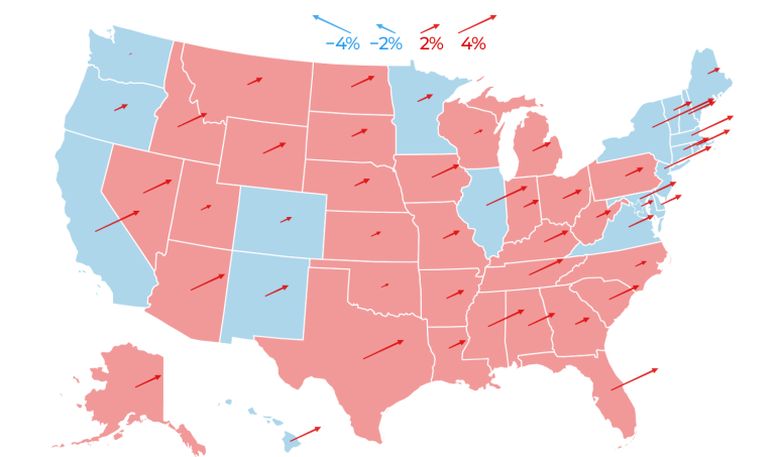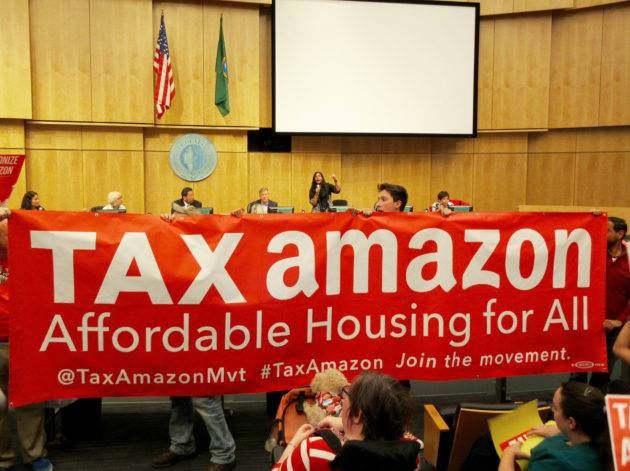Trump (And Trumpism) Can Be Defeated
Kelly Bellin
For many of us, horror at the coming Trump administration is only matched with horror that more than 74 million Americans voted for him. Going into public since November 6th poses the constant question: who around me just voted for an extremely high-profile rapist? How many of my neighbors, coworkers, friends, and family voted for a political agenda that opposes the rights of women, immigrants, and the LGBTQ community?
As a preview of just how much Trump’s decisive election victory has given a dangerous boost to the far right, the FBI is investigating a widespread text message that was sent to Black people across the country, including middle schoolers, calling them “slaves” and telling them to report to the plantation to pick cotton. This text is an extreme example of a real feeling of society moving backwards, ranging from “trad wife” gender roles, to rewriting the history of the civil rights movement, to fetishizing the antebellum South.
Dangerous Rightward Shift
Trump’s victory is a reflection of the growth of right-wing ideas and a shift to the right among a significant section of the working class. Tens of millions of people were willing to vote for a political agenda centered on xenophobia, resting on a far-right base which promotes violence against women, racism, homophobia, transphobia, and a total lack of solidarity. Those voting for Trump while “holding their nose” to these issues shows that they have become less central, at best.
Trump 2.0 is a setback for women’s rights and the struggle against sexism. It reflects a reassertion of misogyny, which of course was never dead but had been the target of movements through the 2010s such as the Slutwalks and #MeToo.
Biden maintained Trump-era deportation policies, but failed to curb a wave of migration caused by wars, climate change and corrupt dictators. This allowed Republican governors and Trump to call for even harsher measures and take the ruling class’s campaign of divide-and-rule xenophobia to new heights. With skyrocketing prices, not enough good-paying jobs and affordable housing units, and too-big class sizes in public schools, the right wing has successfully created a scapegoat in the undocumented immigrant. This is in order to distract millions of workers from the real culprit: capitalism.
But It’s Complicated
Despite a constant campaign from the Christian right, abortion rights remain steadily popular in the US across age, race, and gender. This includes a majority of people who are “Republican leaning.” Voters passed a $15/hr minimum wage—literally more than double the federal minimum wage which neither Obama nor Biden raised—in Missouri, which also went for Trump. This shows that the political mood in society is complicated and the shift to the right also has contradictory features.
Beyond just the ballot initiatives, the last year has seen a significant uptick in major strikes in heavy industry, from auto workers in UAW striking all three major US manufacturers for the first time last year, to International Longshoremen’s Association workers shutting down the East coast ports, to Boeing machinists shutting down production in the Pacific Northwest in the last couple of months. The dockworkers won 62% raises and Boeing workers won 38% raises, all by striking hard against some of the most powerful corporations that exist. Striking is very far from being a right-wing activity, and certainly not something Trump supports. Just a few months ago, Trump praised billionaire Elon Musk for firing striking workers.
But many workers, even those who were just on strike, voted for Trump anyway. It shows that workers can be part of a militant struggle against the boss and still be susceptible to anti-working class ideas like racism, sexism, transphobia, and xenophobia. The divide-and-rule tactics of the bosses have to be actively fought, and we need leaders in the labor movement who fight for the understanding that divisions among workers will always weaken our struggles.
The crucial point is that the main divide in society is not between Democrat and Republican, it’s between workers and the bosses. When “left wing” implies the (rightfully) reviled Democrats who have just spent four years failing to make our lives better, it’s not hard to see how workers can find appeal in the right.
Who’s To Blame for Trump 2.0?
Trump gained support from some of the very groups of people that he and his MAGA base target. Compared to Biden’s historic turnout in 2020, Harris lost support from women, Latino men, and young voters. Millions from these decisive groups either declined to vote or instead, shockingly, voted Trump this time around. The shift of Latino voters is particularly striking, especially considering Trump’s reliance on whipping up racist xenophobia. In 2020, 36% of Latino men voted for Trump. In this election, 54% cast their vote for him. Exit polls indicate that Trump may have garnered the most support of Latino voters (45%) for a Republican presidential candidate ever.
The economy was decisive for this election. The supposedly amazing state of the US economy was paraded through capitalist media outlets in recent weeks. Yet inflation has brutalized working class people, and it’s the super rich who are doing better than ever. A CNN poll indicates that 75% of voters have experienced hardship due to inflation in the last year. Those who’ve experienced hardship, by far, voted for Trump — who promised to “end inflation,” make tips and overtime pay tax-free, and abolish tax on social security payments.
It’s unlikely that Trump will be able to deliver on these promises, and if he does they will be diligently made up for by attacks on working people to appease his billionaire friends. But by pandering to the right and leaving economic conditions unanswered, the Harris campaign allowed Trump to pose as the “vote for change” candidate again.
So how much of Trump’s victory is a rejection of the Democrats, and how much of it is a growing appeal of right-wing ideas? The two are completely connected.
In the leadup to the election, it was heavily speculated that having reproductive healthcare measures on several state ballots could help boost Harris’ turnout. Yet in every state that it was on the ballot, abortion rights received more votes than Harris, meaning, yes, some people voted for Trump and for abortion access. This shows how unconfident people are that the Democrats will fight for reproductive justice.
The feeling that many have, that Democrats have been playing politics with our lives, is rooted in reality. Trump’s election victory just made the world more dangerous for trans kids. And yet, some Democrat politicians are openly drawing the lesson that turning on trans rights and embracing the talking points of the far right is the way for the party to now save itself. Several elected Democrats were interviewed by the New York Times following Trump’s victory who put forward theories of their loss that can be summed up by Rep. Tom Suozzi, D-N.Y. who said, “The Democrats have to stop pandering to the far left, I don’t want to discriminate against anybody, but I don’t think biological boys should be playing in girls’ sports.” Could it be any clearer that the Democrats are not the answer?
Trump (And Trumpism) Can Be Defeated
In the wake of setbacks for social movements and betrayals from Democrats, Trump’s election victory is a dangerous setback for struggles against oppression. It reflects that right-wing ideas have been clawing back into society, and the far right has made gains. Now Trump takes office after the most successful Republican presidential election since the 1980s, and with conservative control of all three branches of government. His administration, and the life it brings to the far right, will be profoundly dangerous for working people. Even more dangerous if his victory succeeds at putting a blanket of demoralization over those who oppose him.
We know from his last time in office that mass protests and working-class action can stop Trump from implementing parts of his agenda. Delivering defeats to Trump’s agenda and pointing to capitalism as the root of our problems is also the best way to convince working people to throw out right-wing ideology. Mass movements can shape ideas and attitudes among wider sections of society very quickly, especially when they offer a way forward when the establishment has no answers.
The current rightward trend is reversible, but not through the Democratic Party and not without building a fighting mass movement with a bold working-class program that can win actual victories to improve the lives of ordinary people. So, this is precisely what we need to do.




